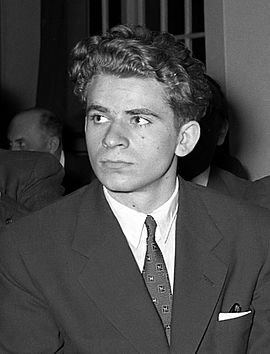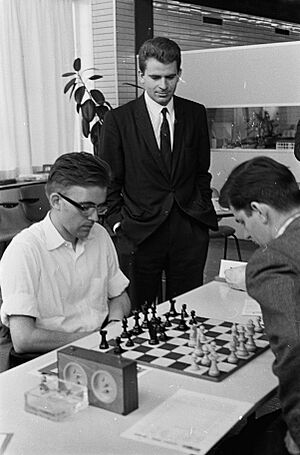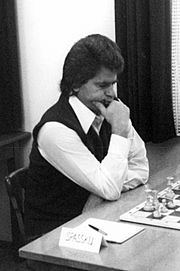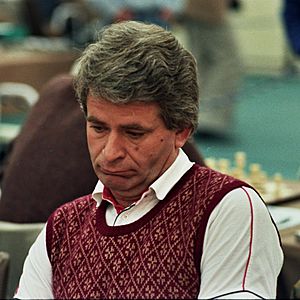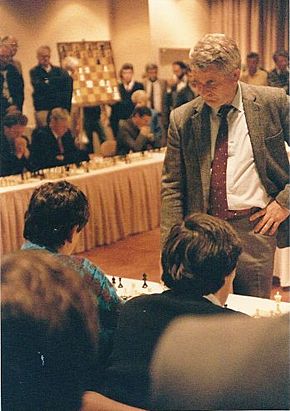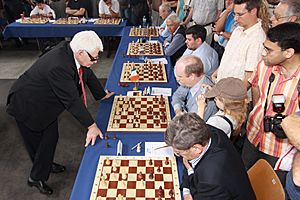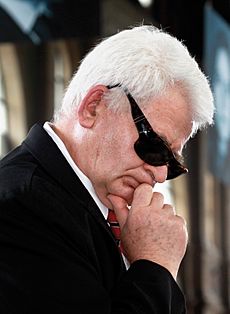Boris Spassky facts for kids
Quick facts for kids Boris Spassky |
|
|---|---|
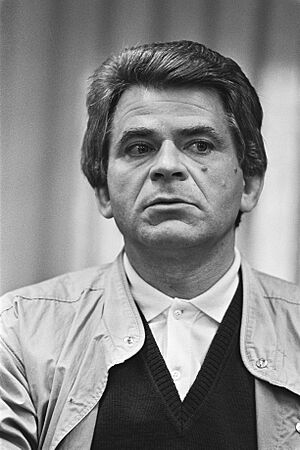
Spassky in 1983
|
|
| Full name | Boris Vasilyevich Spassky |
| Country |
|
| Born | January 30, 1937 Leningrad, Soviet Union |
| Died | February 27, 2025 (aged 88) Moscow, Russia |
| Title | Grandmaster (1955) |
| World Champion | 1969–1972 |
| FIDE rating | 2548 (February 2026) |
| Peak rating | 2690 (January 1971) |
| Peak ranking | No. 2 (January 1971) |
Boris Vasilyevich Spassky (Russian: Борис Васильевич Спасский; January 30, 1937 – February 27, 2025) was a Russian chess grandmaster. He was the tenth World Chess Champion, holding the title from 1969 to 1972. Spassky played in three world championship matches. He first lost to Tigran Petrosian in 1966. Then, he defeated Petrosian in 1969 to become world champion. Later, he lost to Bobby Fischer in a very famous match in 1972.
Spassky won the Soviet Chess Championship twice, in 1961 and 1973. He also tied for first place twice, in 1956 and 1963, but lost in tie-breaking games. He was a World Chess Championship candidate seven times. Besides winning the Candidates matches in 1965 and 1968, he reached the semi-finals in 1974 and the finals in 1977.
Spassky moved to France in 1976 and became a French citizen in 1978. He kept playing in tournaments, but he was no longer a main challenger for the world title. In 1992, Spassky played an unofficial rematch against Bobby Fischer. In 2012, he left France and returned to Russia.
Contents
Early Life and Chess Beginnings
Boris Vasilyevich Spassky was born in Leningrad, Russia, on January 30, 1937. His family was Russian. His father, Vasili Vladimirovich Spassky, was in the military. His mother, Ekaterina Petrovna Spasskaya, was a school teacher.
Spassky learned to play chess at age five. This happened on a train during the siege of Leningrad in World War II. During the war, he lived in an orphanage in Siberia. He first gained attention in 1947 when he was 10. He defeated Soviet champion Mikhail Botvinnik in a special chess event.
Spassky's first coach was Vladimir Zak. He was a respected chess master and trainer. From age 10, Spassky often spent many hours a day studying chess. He became the youngest Soviet player to reach several chess ranks. He was a first-category player at 10, a candidate master at 11, and a Soviet Master at 15. In 1952, at 15, Spassky did well in the Soviet Championship semi-final. He also placed second in the Leningrad City Chess Championship.
Chess Career Highlights
Spassky was known for his flexible playing style. He could adapt to different situations on the chess board. He often used the Sicilian Defence and the Ruy Lopez in his games.
He defeated six undisputed World Champions at least twice. These included Vasily Smyslov, Mikhail Tal, Tigran Petrosian, Bobby Fischer, Anatoly Karpov, and Garry Kasparov.
Becoming a Grandmaster
Spassky played his first international tournament in 1953, at age 16. He finished tied for fourth place in Bucharest, Romania. In that event, he defeated Vasily Smyslov, who would later challenge for the World Championship. The same year, he earned the title of International Master.
In 1955, Spassky played in his first Soviet Championship final. He tied for third place, which allowed him to play in the Gothenburg Interzonal tournament. That same year, he won the World Junior Chess Championship in Belgium.
By sharing seventh place at Gothenburg, Spassky qualified for the 1956 Candidates' Tournament. This automatically made him a grandmaster, making him the youngest at that time. At the 23rd Soviet final in 1956, Spassky tied for first place. However, Mark Taimanov won the playoff to become champion.
Challenges and Comeback
Spassky faced some difficulties in his career for a few years. He did not qualify for the next two major world championship events. This period matched with the end of his first marriage and changing coaches.
He tied for first place in Moscow in 1959. He also shared second place in the 26th Soviet final in 1959. Soon after, Spassky won a tournament in Riga in 1959. In 1960, he shared first place with Bobby Fischer at Mar del Plata, Argentina. He defeated Fischer in their first game against each other.
Spassky decided to change trainers again, choosing Igor Bondarevsky. This change helped him greatly. He won his first Soviet title in 1961. He also won tournaments in Belgrade in 1964.
In 1964, Spassky won the Soviet Zonal tournament. This allowed him to advance to the Amsterdam Interzonal. There, he tied for first place with Mikhail Tal, Vasily Smyslov, and Bent Larsen. All of them qualified for the new Candidates' Matches. With his new coach, Spassky's chess style became stronger and more complete. He also added psychology and surprise to his game.
Becoming World Champion Challenger
Spassky was known as a "universal player" because he could play well in all parts of the game. This helped him defeat many top grandmasters. In the 1965 Candidates' cycle, he beat Paul Keres and Efim Geller. Then, in the Candidates' Final, he defeated Mikhail Tal. Spassky often guided the games into calmer positions, avoiding Tal's strong tactical play.
Spassky won two more tournaments before the World Championship match. He shared first place at the third Chigorin Memorial in Sochi in 1965. He also tied for first at Hastings in 1965–66.
Spassky played a tough match against Petrosian for the World Championship in Moscow in 1966. He lost the match, with Petrosian keeping his title. After this, Spassky finished ahead of Petrosian and other strong players at Santa Monica in 1966. He also won at Beverwijk in 1967 and shared first place at Sochi in 1967.
As the losing finalist in 1966, Spassky automatically entered the next Candidates' cycle. In 1968, he again defeated Geller. He then beat Bent Larsen and his rival Viktor Korchnoi. This earned him another chance to play against Petrosian for the World Championship in 1969. Spassky's flexible style helped him win against Petrosian by 12½–10½, becoming the new World Champion.
World Champion Reign
After winning the title, Spassky played in several tournaments. In October 1969, he placed first in San Juan, Puerto Rico. In March–April 1970, Spassky played for the Soviet team in the famous USSR vs. World event in Belgrade. He also won a tournament in Leiden in 1970 and shared first place in Amsterdam in 1970.
The Match of the Century
Spassky's time as world champion lasted for three years. He lost his title to Bobby Fischer of the United States in the World Chess Championship 1972. This match was very famous and was called the "Match of the Century." It took place in Reykjavík, Iceland, during the Cold War. Many people saw it as a symbol of the competition between the two superpowers. Spassky agreed to many of Fischer's requests, even moving one game to a smaller room. This match was the most talked-about chess match in history.
Before the match, Fischer had never beaten Spassky in five tries. Spassky had also chosen Geller as his coach, who had a good record against Fischer. However, Fischer won the title match with a score of 12½ to 8½.
After the Championship
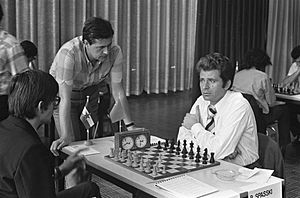
In 1973, Spassky tied for third in Tallinn and tied for first in Dortmund. He also won the 41st Soviet Championship in Moscow.
In the 1974 Candidates' matches, Spassky first defeated American Robert Byrne. However, he then lost the semifinal match to Anatoly Karpov. In 1976, Spassky played in the Interzonal tournament but did not qualify for the Candidates matches. He was later given a spot after Fischer declined his place.
Spassky won an exhibition match against Dutch grandmaster Jan Timman in 1977. He also won his quarterfinal Candidates' match against Vlastimil Hort in 1977. Spassky then defeated Lajos Portisch to reach the final. In the final, he lost to Viktor Korchnoi.
Spassky played in the 1980 Candidates' matches again, facing Portisch. The match ended in a tie, but Portisch advanced. Spassky also played in the 1985 Candidates' event, which was his last time at that level.
Playing for Teams
Spassky played for the USSR in many team events. He played five times in Student Olympiads, winning eight medals, including four gold medals for his team. He also played twice for the USSR in the European Team Championships, winning four gold medals.
Spassky played seven times for the Soviet team in the Chess Olympiads. He won thirteen medals, including six team gold medals and three individual board gold medals.
Later, Spassky represented France in three Olympiads. He played on the top board for France in each of these events.
Later Career and Rematch
In his later years, Spassky did not focus on chess as much as before. In 1976, he moved to France and became a French citizen in 1978.
However, Spassky still had some important wins. In 1978, he tied for first place at Bugojno with Anatoly Karpov. He also won tournaments in Montilla–Moriles in 1978 and shared first place in Munich in 1979. His best result during this time was winning at Linares in 1983. He also won in Reykjavík in 1985.
In 1992, Bobby Fischer returned to chess after 20 years. He arranged a "Revenge Match of the 20th century" against Spassky. This was a rematch of their 1972 World Championship. Spassky lost the match.
Spassky also played against the young chess star Judit Polgár in 1993, losing by a small margin. He continued to play in occasional events through the 1990s.
Later Years and Passing
On October 1, 2006, Spassky had a minor stroke during a chess lecture. In April 2007, he played a rapid chess match against Lajos Portisch, which ended in a draw.
On March 27, 2010, at 73 years old, he became the oldest living former World Chess Champion. This was after the passing of Vasily Smyslov.
On September 23, 2010, Spassky had a more serious stroke that affected his left side. He then went to France for a long recovery program. On August 16, 2012, Spassky returned to Russia and lived in Moscow.
On September 25, 2016, he gave a public speech at the opening of the Tal Memorial tournament. He shared fond memories of Mikhail Tal. Boris Spassky passed away in Moscow on February 27, 2025, at the age of 88.
Spassky's Chess Style
Spassky was known as a "universal player." This means he was good at all parts of a chess game. He was not always an expert in chess openings, but he was excellent in the middlegame and in tactics.
Arkady Dvorkovich, the president of FIDE (the world chess federation), said that Spassky was "not only one of the greatest players... but also a true gentleman."
Spassky used many different chess openings successfully. He even used the King's Gambit, which is an aggressive and risky opening. A chess game from the James Bond movie From Russia with Love was based on a game Spassky played in 1960.
He also helped develop new ideas in chess openings. These include the Marshall Attack for Black in the Ruy Lopez and the Leningrad Variation for White in the Nimzo-Indian Defence. A variation of the Caro-Kann Defense also carries his name.
Boris Spassky was played by Liev Schreiber in the 2014 movie Pawn Sacrifice.
Personal Life
Boris Spassky was married three times. His first wife was Nadezda Konstantinovna Latyntceva, and they had a daughter. His second wife was Larisa Zakharovna Solovyova, and they had a son. His third marriage was in France in 1975 to Marina Yurievna Shcherbachova. They had a son in 1980.
His younger sister, Iraida Spasskaya, was a four-time champion of the Soviet Union in Russian draughts (a game similar to checkers). She was also the world vice-champion in international draughts in 1974.
Spassky once talked about his approach to chess. He said he tried to understand his opponent's personality and how they thought. He believed that chess was a mix of art, science, and sport.
Views and Beliefs
In 2005, Spassky shared his thoughts on the changes in Russia after the Soviet Union ended. He said he believed in a monarchy (a system with a king or queen) and had always felt that way. He also described himself as a Russian nationalist, meaning he felt a strong connection to his Russian heritage and culture. He believed that the greatness of Russia was linked to its national leaders, like the tsars.
He also mentioned that he was an Orthodox Christian. He was happy to see churches becoming active again in modern Russia.
Notable Chess Games
- Boris Spassky vs. David Bronstein, USSR championship, 1960: Spassky won this game with a great rook sacrifice. This game was used in the James Bond movie From Russia with Love.
- Boris Spassky vs. Bobby Fischer, Santa Monica 1966: Fischer made a small mistake, and Spassky took advantage of it to win.
- Boris Spassky vs. Efim Geller, Sukhumi Candidates' match 1968, game 6: One of Spassky's three wins against Geller in this match using a favorite chess variation.
- Boris Spassky vs. Tigran Petrosian, World Championship match, Moscow 1969, game 19: This game showed Spassky's aggressive style and strong combinations.
- Bent Larsen vs. Boris Spassky, Belgrade 1970 (match USSR vs. Rest of the World): Another quick win for Spassky against a famous grandmaster.
- Boris Spassky vs. Bobby Fischer, Siegen Olympiad 1970: Fischer tried the same opening against Spassky as in 1966, and the game was very similar.
- Boris Spassky vs. Bobby Fischer, World Championship match, Reykjavík 1972, game 11: This was Fischer's only loss in his favorite "Poisoned Pawn Variation."
- Anatoly Karpov vs. Boris Spassky, Candidates' match, Leningrad 1974, game 1: Spassky started this match strongly with a win, even though he later lost the match.
See also
 In Spanish: Borís Spaski para niños
In Spanish: Borís Spaski para niños
 | William L. Dawson |
 | W. E. B. Du Bois |
 | Harry Belafonte |


